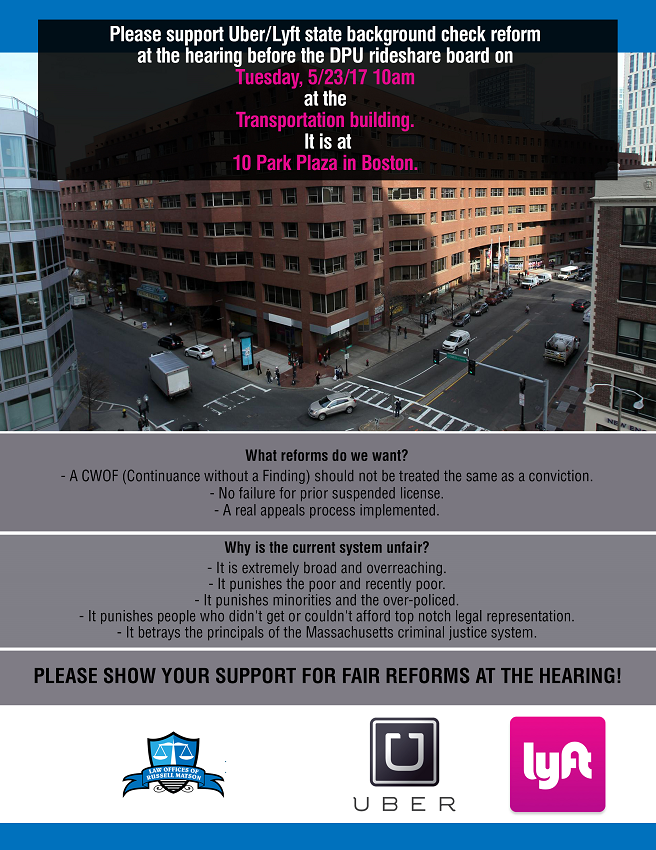Update: 9/18/17: The DPU has released new rideshare background check rules, but they changes appear minimal and insufficient. Uber and Lyft spokespersons say they are reviewing.
- CWOFs that are more than 7 years old can get a hearing before the DPU appeals board. We have no idea how likely they are to reverse a denial if you appeal, and on what grounds they might do so.
- License suspension disqualifications will only go back 5 years instead of 7.
- The TNC has updated their website with appeal process information.
That’s about it.
Johanna Griffiths of the Law Offices of Russell J Matson is quoted in the Boston Globe and the BU Daily Free Press.
“It’s wrong that people in this type of situation are stigmatized in the way that they are,” Griffiths said. “It’s about people having a right to work, getting past mistakes and moving on with their lives.”
“For the most part, you can get any job with a CWOF,” Griffiths said. “The hardest job to get right now in the state of Massachusetts is a job driving for Uber or Lyft.”
—
Update Thursday 5/25: Attorney Johanna Griffiths was on THE TAKE with Sue O’Connell last night on NECN to discuss the hearing. Check out the video.
—
Thanks to everyone who turned out at the hearing. There were about a hundred now-former rideshare drivers sharing compelling and heartbreaking stories of how they have been unfairly treated.
Everyone just wants to earn a fair living in a job they love. One fascinating fact was that practically every single driver cited the exact date and moment they found out about the rejection and removal from the system. Unexpectedly losing your livelihood and the ability to provide for your family is a traumatic incident.
Testifying in favor of reform and on behalf of drivers were from Jessica Taylor Lyft and Tom Maguire from Uber, a variety of criminal justice reform groups including the Lawyers Committee for Civil Rights and Economic Justice, Families for Justice as Healing. Speaking against reforms were Boston police officers and a handful of cabbies.
Many drivers shared stories about disqualifying incidents from decades in the past, dating as far back as 50 years ago. And there were also seemingly trivial incidents of license suspension mix-ups due to unpaid fees years in the past that seemingly couldn’t be resolved.
The insanity of the strictness of the background checks was startling. There were drivers who are completely cleared to do work volunteer work with kids, teach sunday school, carry firearms, and even have valid cabbie licenses, yet they can’t pass the ridiculous TNC standards.
Any reasonable due process and administrative discretion in the appeals process would undoubtedly clear many, if not most of these people to drive. Yet no such process exists.
With the amazing number of drivers who turned out to protest unfair rejection, it will be hard for the DPU to not make changes.
—
Please support Uber/Lyft state background check reform at the hearing before the DPU rideshare board on Tuesday, 5/23/17 10am at the Transportation building. It is at 10 Park Plaza in Boston.
 What background check reforms do we want?
What background check reforms do we want?
- A CWOF (Continuance without a Finding) should not be treated the same as a conviction.
- End the unlimited lookback. Punishing people for things that happened 10, 20, 30 or even 50 years ago is crazy. People make mistakes and they change. No one should be automatically trapped for life by one mistake.
- A seven year look-back for a suspended license is unfair. If a person has a valid license, and meets the other requirements, that is more than sufficient
- A real appeals process implemented with due process and judicial discretion.
Why is the current system unfair?
- It is extremely broad and overreaching. It keeps people from a decent job when there is no legitimate public safety concern.
- It punishes the poor and recently poor. Many people end up with a suspended license simply due to the inability to pay tickets.
- It punishes minorities and the over-policed. The ACLU notes that minority drivers are more likely to have been arrested than white citizens.
- It punishes people who didn’t get or couldn’t afford top notch legal representation. In many cases, if an experienced criminal defense attorney had represented them at the original incident, they could have avoided a conviction (or CWOF) on their record, with a dismissal, a diversion program, or with no charge being issued at a clerk magistrates hearing.
- It betrays the principals of the Massachusetts criminal justice system. A CWOF is not a conviction, and was never intended to be treated as such for the purpose of any background checks.
Don’t Treat CWOFs like Convictions
A CWOF is NOT a conviction, or an admission of guilt. It is an agreement that there are “sufficient facts” that one could be found guilty. And it absolutely is not a free pass, and will count against you in court if you are ever in trouble again, or violate the terms of your probation during the continuance. But it is a chance to get it off your record, usually within a year.
When a person agrees to a CWOF as part of a plea deal, it is with a specific understanding of the consequences. If all agreed upon conditions are met, after the period of the Continuance, the case is effectively dismissed. The assumption is that the disposition will not cause any further harm you your life if you do not get in trouble again.
Changing the rules after the fact betrays that agreement. Given that plea bargains are the overwhelming majority of the outcomes in criminal court, and CWOFs make up a large percentage of first offense misdemeanor charges, changing the impact of an irrevocable decision after the fact is truly unfair.
A CWOF should not impact your job prospects due to a background check after the continuance period is over. The current system of counting CWOFs as convictions makes background checks for drivers stricter than virtually any other profession. For example, we spoke to a pediatric nurse at a Boston hospital who is fully licensed to help vulnerable sick children, but can’t moonlight as a driver.
A seven year lookback for a suspended license is far too long
Either you are safe to drive a vehicle as determined by the Registry, or you aren’t. A valid driver’s license issued by the Commonwealth should be sufficent.
A suspended license for moving violations should not haunt your for 7 years after a clean driving record. In addition, many license suspensions are for unpaid tickets.
Having been too poor to pay a speeding ticket years ago is an awful reason to keep your from earning a living today.
A real appeals process, with judicial discretion
Currently there is no possible appeal if you fail the CORI. They will not even consider your story or the circumstances.
That’s how you get people banned from driving from being convicted of a “violent crime” decades ago, for incidents like a family domestic abuse case where they agreed to a bad plea deal.
Or the case of an accident that resulted in both a DUI and a negligent operation charge from the same incident, again, 20 years ago. But “multiple driving charges” mean it’s an unlimited lookback.
But any reasonable person could hear these cases and recognize that these people are no threat to public safety and should be permitted to earn a living.
Who supports reform?
Our involvement as a law firm began when we started receiving lots of calls from rejected drivers based on our legal expertise on CORI issues and record sealing.
Unfortunately, we have been unable to help any of these drivers, due to these extreme rules accepted on the Memorandum of Understanding by the rideshare companies and virtually no appeals process possible..
We were not surprised to later learn that the number of rejected drivers was 8,000.
Since then both Lyft and Uber have come to understand the scope of the agreement, and think it went too far. In addition, criminal justice reform organizations who support restorative justice have been fighting hard for changes.
We hope anyone who supports fair treatment for workers and criminal justice reform will come out in support of changes on the 23rd.

 What background check reforms do we want?
What background check reforms do we want?